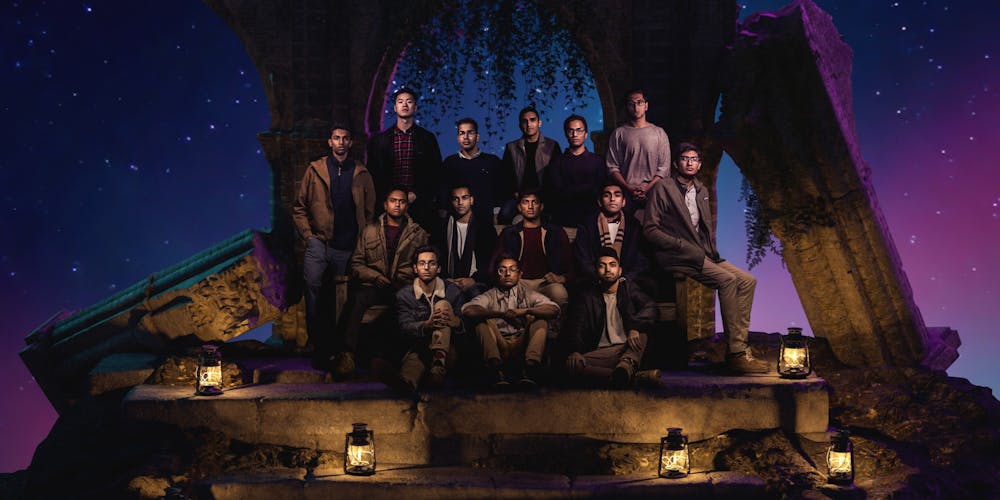Does your a capella group have 11 albums?
Kushal Modi (C'21), Shrivats Kannan (E'22), Sachit Gali (C'23), and Ajay Vasisht (W'20) of Penn Masala to discuss their 11th album, Musafir, which was released on February 9th.
With their new album, the South Asian–Western fusion a cappella group sought "to use their platform to engage with issues [they] find important, such as mental health and South-Asian identity," Modi said.
Aptly, the record is titled Musafir, which means "traveler" in Hindi. With mashups of popular American songs and traditional South–Asian songs, Penn Masala once again bridges the gap between South Asian and American cultures to create a compellingly global body of work.
Penn Masala was founded in 1996 as Penn's first South Asian a cappella group, becoming one of the most influential in the world of South Asian–Western fusion, Vasisht says. Having previously collaborated with renowned Indian composer A. R. Rahaman and singer Benny Dayal, as well as performing for people such as Anderson Cooper and President Barack Obama, Penn Masala has established itself at the forefront of a cappella both at home and a broad. They were even featured in the film Pitch Perfect 2 in 2015.
This cross-cultural ethos is reflected in songs such as "Controlla / Baarish" and "Cake by the Ocean / Ghungroo / Stronger" from the new album, where bright American melodies brush shoulders with rousing Indian harmonies so smoothly that the listener sometimes doesn't notice that the lyrics have changed languages. Vasisht boasts that the group has been using "innovative techniques for over 24 years," "continuing to push both music and cultural boundaries."
The closeness of the group is palpable. Besides practicing for about three hours a day together, the a cappella group also helps each other succeed outside of music. Recalling his first-year year trip to India with the group, Vasishit tells of the time one member was lost in Mumbai without a phone, only to be discovered on the hotel's security cameras. In the early summer he will travel to India with Penn Masala again, hitting spots around "the entire country." At the mention of India, the mood of the group turns noticeably lighter as Ajay recounts how his experience there and all that it has to offer for other members who have yet to go.
Musafir's strength lies in its fluidity and cultural fluency, melding languages and melodies together into strikingly cosmopolitan compositions. When listened to from start to finish, the album blends into itself, quickening the passage of time as it hypnotically folds hooks and verses like fine linens, before unfurling them into magnificent flags.

Take, for example, "Ae Watan," an early highlight that shines for its relative simplicity in comparison to the songs that come directly before and after it—two mashups that deftly balance opposing American and South–Asian song structures. By the time "Koi Mil Gaya / Ruk Ja O Dil Deewane" rolls around, you are so caught up in the chorus of voices that it doesn't matter if you don't understand the lyrics.
The clarity and grace of Penn Masala's voices is enough to carry the weight of translation across the oceans, creating a global narrative of cross–cultural harmony (both in the musical and actual sense). Indeed, Musafir has a "we are the world" energy about it, but in a good way—marked by sincerity, talent, and a belief that home can be at once two places and one. As the title of the stirring closer, "United By Music" suggests, divisions are only held in the mind.
Penn Masala eagerly awaits their tour, which hits colleges such as Duke, Georgetown, and Middlebury. They will also play here at the Irvine Auditorium on March 21st to perform Musafir: The Official Album Release Show.







